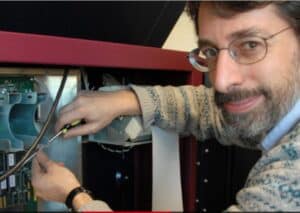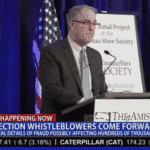Texas Senator Ted Cruz issued a statement yesterday calling upon the Supreme Court to hear a Pennsylvania election challenge stemming from a lawsuit filed by PA congressional candidate Sean Parnell and Congressman Mike Kelly (R-PA).
Last month, the two Pennsylvanians filed a lawsuit claiming that universal mail-in voting was unconstitutional in their state. Unsurprisingly, the Democrat-led PA Supreme Court rejected the lawsuit and Parnell and Kelly filed an emergency appeal to the Supreme Court.
“This appeal raises serious legal issues, and I believe the Court should hear the case on an expedited basis,” Cruz wrote.
“The Pennsylvania Constitution requires in-person voting, except in narrow and defined circumstances. Late last year, the Pennsylvania Legislature passed a law that purported to allow universal mail-in voting, notwithstanding the Pennsylvania Constitution’s express prohibition,” his statement continues.
Cruz also cited Americans’ lack of trust in election integrity as a reason for the Supreme Court to get involved.
“As of today, according to Reuters/Ipsos polling, 39 percent of Americans believe that “the election was rigged. That is not healthy for our democracy,” he wrote. “The bitter division and acrimony we see across the nation needs resolution. And I believe the U.S. Supreme Court has a responsibility to the American people to ensure that we are following the law and following the Constitution. Hearing this case-now, on an emergency expedited basis-would be an important step in helping rebuild confidence in the integrity of our democratic system.”
#SCOTUS should hear the emergency appeal on the Pennsylvania election challenge. pic.twitter.com/mzwr4eaHR8
— Ted Cruz (@tedcruz) December 1, 2020
H/T: The Blaze
Can You Hack an Election in 7 Minutes?
Can an election be hacked in seven minutes?
Andrew Appel, a professor at Princeton University set out to do just that, hack into a voting machine. In order to do this he could have tried traditional ways of hacking or writing malware to sneak on to a machine at a polling place that are left unguarded for days, but he decided it was much easier to just buy one online.
For the cost of a whole $82, Appel became the proud owner of a behemoth machine called Sequoia AVC Advantage. This machine is one of the oldest and most vulnerable in the US and is unfortunately used in places like Louisiana, New Jersey, Virginia and Pennsylvania.
No sooner did a team of bewildered deliverymen roll the 250-pound device into a conference room near Appel’s cramped, third-floor office than the professor set to work. He summoned a graduate student named Alex Halderman, who could pick the machine’s lock in seven seconds.
Clutching a screwdriver, he deftly wedged out the four ROM chips—they weren’t soldered into the circuit board, as sense might dictate—making it simple to replace them with one of his own: A version of modified firmware that could throw off the machine’s results, subtly altering the tally of votes, never to betray a hint to the voter. The attack was concluded in minutes.
To mark the achievement, his student snapped a photo of Appel—oblong features, messy black locks and a salt-and-pepper beard—grinning for the camera, fists still on the circuit board, as if to look directly into the eyes of the American taxpayer: Don’t look at me—you’re the one who paid for this thing.

Appel’s mischief might be called an occupational asset: He is part of a diligent corps of so-called cyber-academics—professors who have spent the past decade serving their country by relentlessly hacking it.
Electronic voting machines—particularly a design called Direct Recording Electronic, or DRE’s—took off in 2002, in the wake of Bush v. Gore. For the ensuing 15 years, Appel and his colleagues have deployed every manner of stunt to convince the public that the system is pervasively unsecure and vulnerable.
Beginning in the late ’90s, Appel and his colleague, Ed Felten, a pioneer in computer engineering now serving in the White House Office of Science and Technology Policy, marsha led their Princeton students together at the Center for Information Technology Policy (where Felten is still director).
There, they relentlessly hacked one voting machine after another, transforming the center into a kind of Hall of Fame for tech mediocrity: reprogramming one popular machine to play Pac-Man; infecting popular models with self-duplicating malware; discovering keys to voting machine locks that could be ordered on eBay.
Eventually, the work of the professors and Ph.D. students grew into a singular conviction: It was only a matter of time, they feared, before a national election—an irresistible target—would invite an attempt at a coordinated cyberattack.
There is no singular national body that regulates the security or even execution of what happens on Election Day, and there never has been. It’s a process regulated state by state.
The Princeton group has a simple message: That the machines that Americans use at the polls are less secure than the iPhones they use to navigate their way there. They’ve seen the skeletons of code inside electronic voting’s digital closet, and they’ve mastered the equipment’s vulnerabilities perhaps better than anyone (a contention the voting machine companies contest, of course).
They insist the elections could be vulnerable at myriad strike points, among them the software that aggregates the precinct vote totals, and the voter registration rolls that are increasingly digitized. But the threat, the cyber experts say, starts with the machines that tally the votes and crucially keep a record of them—or, in some cases, don’t.
Cleary hacking into voting machines is an easy task, which is a major concern for our democracy. If powerful people with money and resources want to stay in control, we now know they can make that happen very easily.
A WHOPPING 56% of Americans Say They are Better off Today (Mid-Pandemic) than Under Obama-Biden
A recent Gallup survey found that a whopping 56 percent of Americans say they are better off now under President Trump–in the middle of a pandemic–than they were four years ago when President Obama was in office.
Gallup writes:
During his presidential campaign in 1980, Ronald Reagan asked Americans, “Are you better off today than you were four years ago?” Since then, this question has served as a key standard that sitting presidents running for reelection have been held to.
Gallup’s most recent survey found a clear majority of registered voters (56%) saying they are better off now than they were four years ago, while 32% said they are worse off.
The Gallup Poll has just come out with the incredible finding that 56% of you say that you are better off today, during a pandemic, than you were four years ago (OBiden). Highest number on record! Pretty amazing!
— Donald J. Trump (@realDonaldTrump) October 9, 2020
Gallup compared the 56 percent number to 2012, during the Obama-Biden Administration when just 45 percent of Americans could say they felt they were better off. In 2004, 47 percent of Americans said they were better off and in 1992, that number was at 38 percent.
President Trump responded to the news, writing on Twitter, “The Gallup Poll has just come out with the incredible finding that 56% of you say that you are better off today, during a pandemic, than you were four years ago (Biden). The highest number on record! Pretty amazing!”










